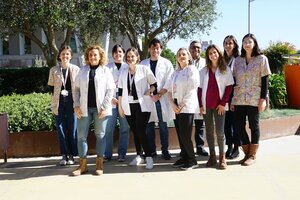The first clinical trial of a gene therapy for Duchenne in children under 4 years old is initiated.
A research team from the Institut de Recerca Sant Joan de Déu · SJD Barcelona Children’s Hospital is participating in an international clinical trial of a gene therapy for Duchenne muscular dystrophy in children under 4 years old.
The Sant Joan de Déu Trial Unit, led by Dr. Andrés Nascimento, a researcher at IRSJD, has been the first in the world to include a patient under 4 years old and administer this gene therapy treatment. It is anticipated that as a reference hospital and the initial center to initiate the study, they will have the ability to provide access to this treatment to a greater number of children.
Duchenne muscular dystrophy is a rare hereditary disorder that is categorized under the category of rare diseases. It is a genetic disorder that is associated with the X chromosome and causes a progressive decline in muscle strength. Typically, it is identified during the initial stages of childhood, accompanied by a progressive decline in muscular function.
The onset of muscle weakness is typically observed between the ages of 3 to 4 years, and individuals affected typically experience a loss of walking ability between the ages of 12 and 14. There are currently no available treatments for this condition, which makes it difficult to treat. The prevailing therapies aim to halt its progression, however, they have not been able to effectively stabilize the condition.
However, gene therapy represents the most hopeful treatment strategy for this dystrophy, which is linked to genetic factors. Previously, this therapeutic modality was only available to patients over the age of 4, with encouraging results. The FDA (Food and Drug Administration) has now approved its use in children between the ages of 4 and 5. Since the disease progresses over time, causing muscle tissue to be replaced with fat and fibrosis, it is crucial to provide treatment before the muscle deterioration becomes irreversible.
"Our team has already included the first child in the world in this new trial, called Envol, and is waiting for other centers to join. We are already examining other families to continue treating these children with gene therapy." It explains Dr. Andrés Nascimento, head of the Neuromuscular Diseases Unit at SJD Barcelona Children’s Hospital and a member of the Applied research in neuromuscular diseases at the Institut de Recerca Sant Joan de Déu, and he adds: “The treatment was administered several weeks ago, and the patient has remained stable without side effects. He is awaiting confirmation of the positive results in his evolution. We have high expectations, as the changes that this gene therapy can generate occur on more preserved muscle tissue." Continues the expert.
The challenge of transfecting the dystrophin gene into the patients' cells
The introduction of gene therapy represents an important milestone in the treatment of Duchenne muscular dystrophy, especially in the pediatric field. A significant obstacle for this therapeutic approach has been the size of the dystrophin gene, which is too large to be transferred via conventional viral vectors, such as modified adenoviruses, which are utilized to deliver the new gene into muscle cells.
A few years ago, a group of patients who had reached advanced adult ages with muscle pain, increased muscle enzymes, certain mobility difficulties, and motor alterations but retained the ability to walk was observed. These individuals had mutations in the dystrophin gene that resulted in smaller but functional versions of the protein, known as microdystrophins. This observation suggested that the presence of microdystrophin, although smaller in quantity or size, could provide some protection against the severe symptoms of Duchenne muscular dystrophy. Based on these findings, scientists began to investigate the possibility of using microdystrophin as a therapeutic option for patients with Duchenne muscular dystrophy.
Preclinical tests were initiated and Sarepta laboratories promoted phase 1 and 2 clinical trials to demonstrate their safety and effectiveness. This led to the development of the phase 3 clinical trial Embark for children aged 4 to 8 years, where microdystrophin, associated with a modified adenovirus vector, was introduced into the muscle cells of the participants. The participants showed notable improvements in motor functions.
Several weeks ago, the Envol clinical trial was initiated for children under the age of 4. Based on the safety results of this group, the trial will initially include 10 patients between 3 and under 4 years old. Afterwards, participation will be allowed for patients younger than 3 to 2 years old, and even infants. The aim is to determine the safety and impact of early treatment.
The SJD Barcelona Children’s Hospital · IRSJD has already taken the first patient in this international trial. Six European countries are participating in the trial, including the United Kingdom, Italy, the Netherlands, France, Belgium, and Spain.
"Our objective is to consistently provide all treatment options to our patients, however, not all individuals are eligible for this service. There exist highly precise clinical and genetic criteria that must be fulfilled. Patients must not have antibodies against the vector (modified adenovirus) that carries the microgene of dystrophin, which is one of the major limitations in receiving the treatment." points out Andrés Nascimento.

Gene therapy is, today, one of the treatments that could slow the progression of the disease.
